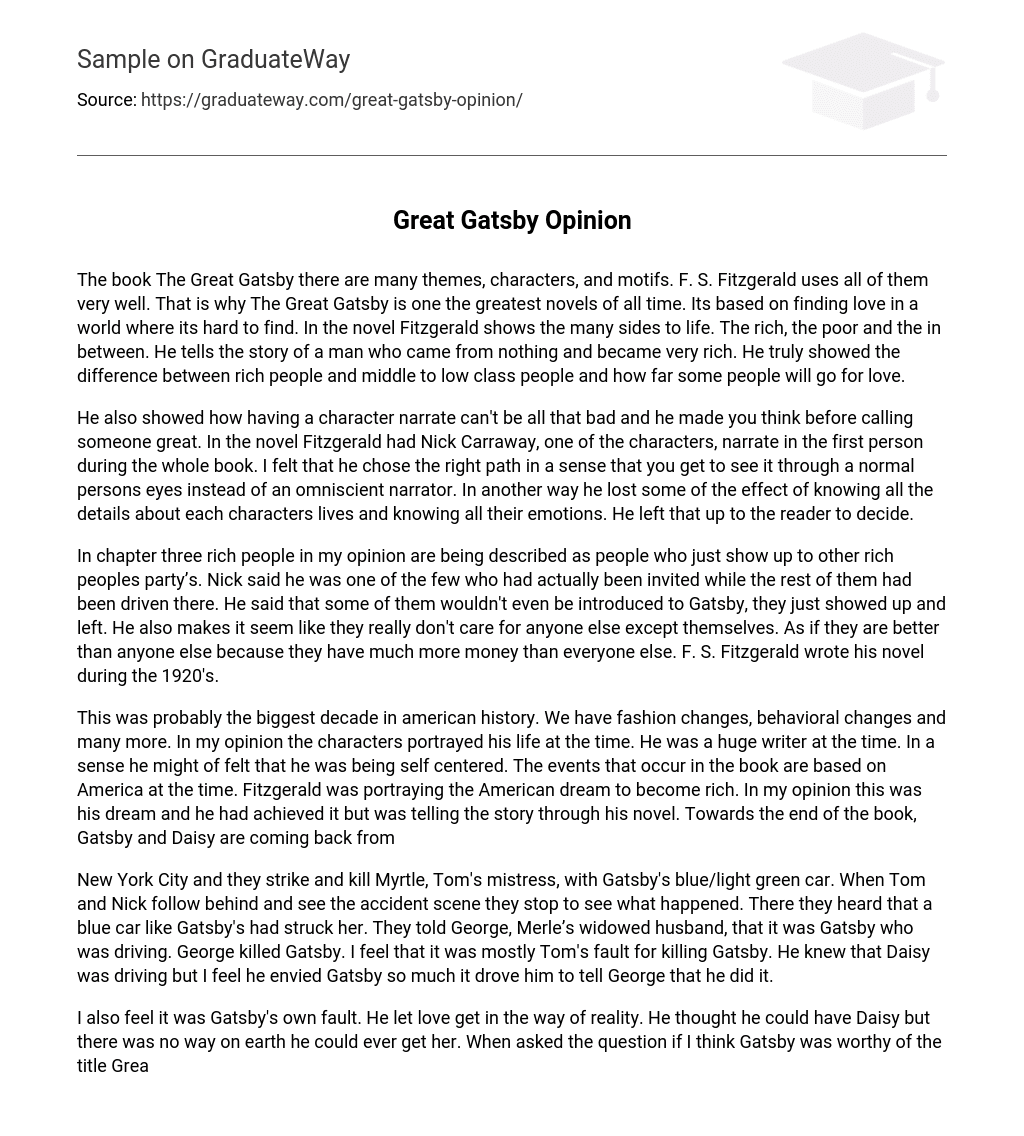In F. S. Fitzgerald’s The Great Gatsby, themes, characters, and motifs are skillfully employed to create one of the most renowned novels ever written. The story centers around the quest for love in a difficult society. Fitzgerald presents different facets of life, encompassing both the affluent and the destitute, as well as those falling in between. This novel narrates the journey of an individual who went from having nothing to amassing great riches, emphasizing the contrasting existences of the wealthy and those belonging to middle or lower class backgrounds, along with illustrating the extreme lengths some people will go to for love.
Fitzgerald’s novel uses first-person narration by Nick Carraway as the storyteller, giving readers a regular person’s perspective rather than an omniscient narrator. This viewpoint allows for diverse interpretations of the complexities and emotions in the characters’ lives.
In chapter three of the novel, F.S. Fitzgerald portrays wealthy individuals as exclusively attending parties hosted by fellow wealthy individuals. One character named Nick claims to have received a genuine invitation, unlike many others who rely on someone else for transportation. Additionally, he suggests that some attendees never actually encounter Gatsby; they simply arrive and depart without any interaction. Furthermore, Nick implies that these partygoers demonstrate a lack of consideration for others and possess an arrogant belief in their superiority due to their wealth. It is worth noting that Fitzgerald wrote this book during the 1920s.
This era in American history was incredibly important, with significant changes in fashion and behavior. In my view, the individuals truly embodied the spirit of that time. He was a renowned writer during this period, although some may have considered him self-centered. The events described in the book were directly influenced by America’s circumstances at that specific time. Fitzgerald aimed to depict the quest for wealth and achieving the American dream. In my perspective, this dream held profound personal significance for him and he expressed it through his novel. Towards the end of the narrative, Gatsby and Daisy are coming back from
In New York City, Gatsby’s blue/light green car strikes and kills Myrtle, who is Tom’s mistress. Upon witnessing the accident, Tom and Nick stop to investigate. They learn that a car similar to Gatsby’s had hit Myrtle. They inform George, Myrtle’s widowed husband, that Gatsby was the driver. As a result, George kills Gatsby. Personally, I believe Tom is primarily responsible for Gatsby’s death. Despite knowing that Daisy was driving, his envy towards Gatsby drives him to incriminate him to George.
In my opinion, Gatsby’s own actions are responsible for his situation. He allowed his love for Daisy to cloud his judgment and disregard the reality that they could never be together. As for whether I believe Gatsby deserves the title of “Great,” my answer is a combination of yes and no. Yes, because he faced numerous hardships. He prioritized his military service over his relationship with Daisy and upon returning, he worked diligently to better his life and achieved significant financial success. However, no, due to his misguided pursuit of love. He naively believed that he could attain love in an impossible situation, regardless of how hard he tried.
Despite pursuing his lifelong sweetheart who was already married and with children, I would regard him as Great in terms of his journey to wealth. However, concerning his morals and approach to finding love, I would argue that he is undeserving of that title. Ultimately, I believe that Gatsby had no malicious intentions. He was simply blinded and unable to perceive the truth. We all make comparable mistakes at times and we gain knowledge from them. Regrettably, Gatsby failed to learn from his mistakes and ultimately suffered the consequences by dying for love.





